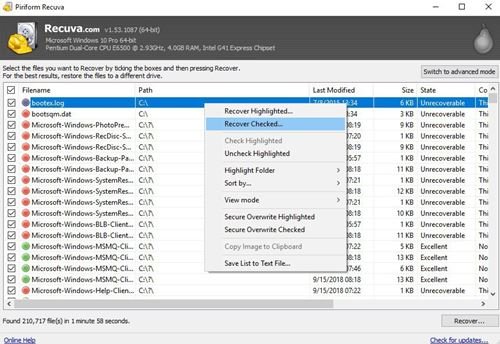| Developer(s) | Piriform |
|---|---|
| Initial release | 7 August 2007; 13 years ago[1] |
| Stable release | v1.53.1087 (08 Jun 2016) |
| Operating system | Windows 10, 8.1, 7, Vista and XP. Including both 32-bit and 64-bit versions, but not RT tablet editions. |
| Size | 4.2 MB |
| Available in | 30+ languages |
| Type | Undeletion |
| License | Freemium |
| Website | www.ccleaner.com/recuva |

Recuva is a freemium software, which means you can get the basic package 100% free or upgrade to the premium package and get some extra features. The free version of Recuva will conduct complete scans and undelete most files. The current version of Recuva is 1.53.1087 and is the latest version since we last checked. This is the full offline installer setup file for PC. This site has hosted other versions of it in the past such as 1.52.1086, 1.51.1063, 1.50.1036, 1.47.948 and 1.45.858. At the moment, only the latest version is available. Recuva can recover pictures, music, documents, videos, emails or any other file type you’ve lost. And it can recover from any rewriteable media you have, memory cards, external hard drives, USB sticks and more! Unlike most file recovery tools, Recuva can recover files from damaged or newly formatted drives. After the download has finished, click Run to start installing Recuva. Chromium-based browsers (such as Google Chrome, CCleaner Browser, or the new Microsoft Edge): Step 1 - Download and Run the installer.

Recuva (/rɪˈkʌvə/)[2] is an undeletion program for Windows, developed by Piriform. It is able to undelete files that have been marked as deleted; the operating system marks the areas of the disk in which they were stored as free space.[3] Recuva can recover files deleted from internal and external hard disk drives, USB flash drives, memory cards, portable media players or all random-access storage mediums with a supported file system.[4][5]

Recuva was described by vnunet.com as an 'effective tool for undeleting or salvaging files we sent for recycling and deleted, in the past'.[6] The program works on FAT, exFAT and NTFS file systems of Windows.[7] It is able to recover lost directory structure and automatically renames files when trying to recover two files of the same name. As of version 1.5.3 it can also recover files from Ext2, Ext3 and Ext4 file systems of Linux.[8]
As with other file recovery programs Recuva works by looking for unreferenced data, but if the operating system has written new data over a deleted file then recovery will often not be possible.[9][10]
See also[edit]
Recuva Portable Zip
References[edit]
Recuva For Android
- ^'Download Recuva'. FileHippo. Retrieved 2010-03-03.
- ^'Recuva - File Recovery'. Recuva archived website from 2009. Archived from the original on September 4, 2009. Retrieved 18 November 2014.
- ^'Five free portable recovery tools'. TechRepublic. September 4, 2012. Retrieved October 13, 2012.
- ^'Recuva - free file recovery software'. Softonline.net. Retrieved 2020-09-09.
- ^'Repair Tool of the Week: Recuva Portable'. technibble.com. Retrieved 2009-01-01.
- ^'Recuva 1.22'. vnunet.com. Archived from the original on 2007-12-20. Retrieved 2009-01-01.
- ^'Recuva 1.38.504'. PCWorld. Retrieved 2010-12-13.
- ^https://www.ccleaner.com/recuva/release-notes
- ^'Recovering A Deleted File'. Employees Only. Retrieved 2009-01-01.
- ^'Recovering a deleted file (archived at The Wayback Machine)'. Employees Only. Archived from the original on 2008-06-03.